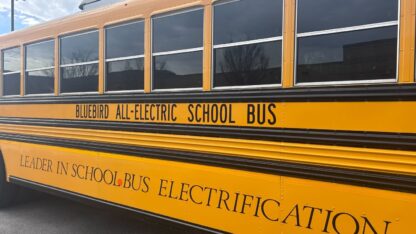On a January afternoon at the Decatur Goodwill career center, Quontavious Miles, a Marine veteran wearing a navy blue maintenance uniform, is learning to install electric vehicle chargers. In front of him are tools, a shiny metal box, and some colorfully cased copper wires.
“The last job was just what you say it was a job have something to do to get paid. This feels like the beginning of a brand new career field,” Miles said.
Investments in the EV sector in Georgia were accompanied by sweeping promises of thousands of jobs. At the beginning of this year, Goodwill of North Georgia launched its program to train people to move from low-wage positions to green jobs of the future, most of which are not here yet.
Miles and his 14 classmates are the first paid participants training to work in electric vehicle charging.
According to the US Department of Energy, Georgia has almost 2,000 station locations and over 5,000 EV charging ports.
Recently, The White House announced millions in federal funds to add more chargers in the state. Goodwill’s program seeks to add more skilled workers who can install them.
The nonprofit whittled down hundreds of applications for the program to have 45 participants across three cohorts. Several private companies helped in the design.
“What they hope to do is to leave us where we have job placement by the time we’re done,” Miles said. “Right now, we’re practicing mock interviews, they’re getting our resumes curtailed and completely finished.”
“It feels like family, I feel like I’m in a class with 14 brothers,” said Donna Level, the only woman in the first cohort.
“I came here to the center with no expectation,” Level said. “I didn’t know what they had to offer. But when I went through the list of classes and actually did further research, you know, I became interested in this in particular.”
Jenny Taylor is the vice president of Career Services for Goodwill North Georgia.
She says their goal for the first pilot project cohort was for 80% of participants to have jobs by last month.
“I will begin to be concerned if we don’t have them employed by May 23, which is that 90-day benchmark,” Taylor said.
Now, there’s cause for concern.
According to AAA, interest in EVs has stalled this year, and with Rivian putting a pause on its Georgia factory, the thousands of jobs we expect to see now come into question.
Taylor says the jobs weren’t there as they had expected when participants finished the program.
“There is no guarantee of employment after the last day of class,” Taylor said.
Only seven of the 45 participants had jobs as of May 21.
Quontavious Miles is one of the ones still waiting.
“Just the way things panned out, you know, it kind of made you feel like, ‘Was it all worth it?’ you know what I mean,” he said.
Taylor says she understands the disappointment and thinks the program was a victim of too much hype.
“They thought they were going to get a job on day one of their graduation because we were so excited for them that they misunderstood,” Taylor said. “And so I feel a little bad because we had all that excitement in front of them, and we didn’t tell them what that meant and why we were so excited.”
In spite of his employment search, Miles remains hopeful. He is thankful to Goodwill for their program, but for now…
“It took away the idea of, you know, I’m not working for anybody less than maybe Tesla charge point,” he said. “And making $30 an hour is now essentially nowhere. It’s kind of survival mode at this point.”
As we watch how the future of sustainable technology manifests in Georgia, these Goodwill participants will have to remain patient for their green light into the industry.










